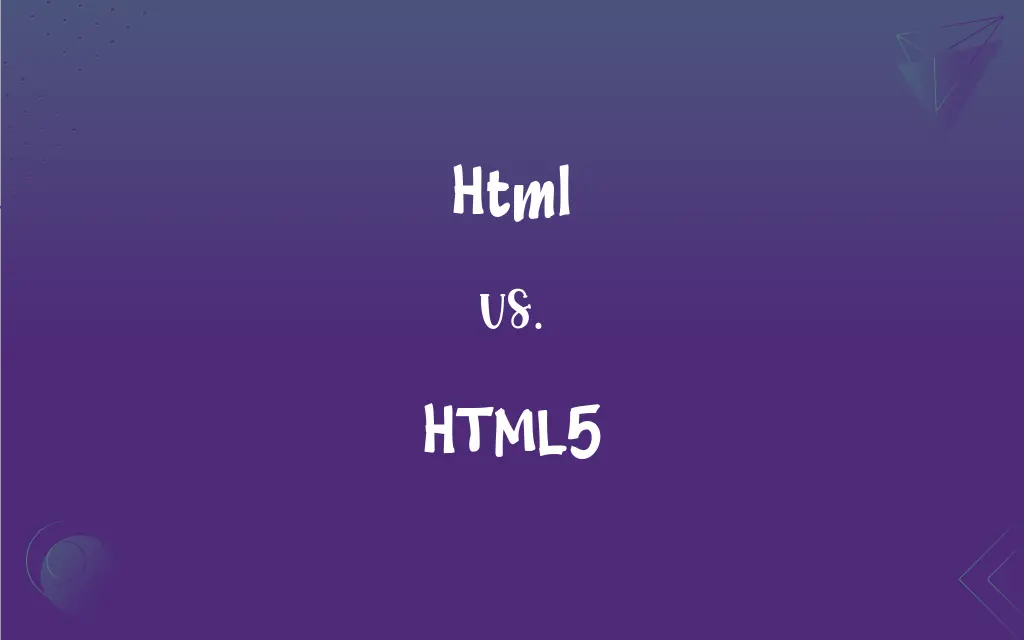HTML vs. HTML5: What's the Difference?
Edited by Janet White || By Harlon Moss || Updated on October 13, 2023
HTML (HyperText Markup Language) is a standard markup language for creating web pages, while HTML5 is its fifth and latest major version, featuring new elements, behaviors, and APIs enhancing multimedia and graphical content.

Key Differences
HTML has long served as the backbone for web content creation, utilizing tags and elements to structure and format documents. HTML5, a subsequent version, introduced new tags and APIs specifically tailored to optimize multimedia content and enhance user interaction.
In terms of multimedia support, HTML traditionally required plugins (like Flash) to manage multimedia content effectively. HTML5 innovatively integrates multimedia elements like
Accessibility and semantics are substantially improved in HTML5 compared to its predecessors. HTML provides basic structure and formatting to web content, whereas HTML5 introduces more semantic elements (such as , , and
When discussing browser compatibility, HTML exhibits widespread consistency and is amicably supported by most browsers. HTML5, while becoming a standard, might encounter varied support across different browsers, particularly when it comes to its advanced features and elements, but still, it's recognized and adopted globally.
Comparison Chart
Semantics and Accessibility
Basic semantic elements.
Introduces new semantic elements for improved accessibility.
ADVERTISEMENT
APIs
Lacks extensive API support.
Offers a rich set of APIs for offline, storage, and more.
Browser Support
Broadly consistent across browsers.
Varied support for some advanced features across browsers.
HTML and HTML5 Definitions
Html
HTML is a standardized markup language for creating and designing web pages.
Using HTML, she structured the webpage’s content effectively.
HTML5
HTML5 offers new semantic elements to enhance the meaning and accessibility of web content.
Utilizing HTML5, she structured the content using and tags for better semantics.
Html
HTML utilizes tags to define elements and structure on a web page.
In HTML, the
tag defines a paragraph.
ADVERTISEMENT
HTML5
HTML5 introduces native support for embedded video and audio content without requiring plugins.
The developer used HTML5 to embed a video directly into the web page without relying on Flash.
Html
HTML allows for the embedding of images, videos, and other multimedia.
She used HTML to embed an image into the webpage.
HTML5
HTML5 supports cross-platform development, enabling applications to run on various devices and operating systems.
The designer leveraged HTML5 to create a web application that operated smoothly across both desktop and mobile platforms.
Html
HTML provides a foundation for web browsers to interpret and display web content.
Browsers render HTML into visually structured webpages for viewers.
HTML5
HTML5 enhances web user experiences by introducing various APIs for offline usage, local storage, and more.
Using HTML5, he developed a web application that could store data locally, facilitating offline access.
Html
HTML can be integrated with CSS and JavaScript to create interactive and styled web pages.
With HTML as the skeleton, he applied CSS for style and JavaScript for interactivity on the website.
Html
A markup language used to structure text and multimedia documents and to set up hypertext links between documents, used extensively on the World Wide Web.
Html
A set of tags and rules (conforming to SGML) for using them in developing hypertext documents
FAQs
Can HTML create interactive web content?
While HTML structures web content, it often works with JavaScript and CSS to create interactive and styled web pages.
What are HTML elements?
HTML elements, defined by tags, represent different parts of web content and provide structure and formatting instructions to browsers.
How does HTML structure web content?
HTML uses elements, represented by tags, to define and structure different parts of web content, such as headings, paragraphs, and lists.
Is HTML a programming language?
No, HTML is a markup language, providing structure and format to web content but not possessing programming functionality.
How does HTML5 differ from HTML?
HTML5 is the latest version of HTML, introducing new elements, attributes, and APIs, with enhanced multimedia and improved semantics.
How do HTML and CSS work together?
HTML structures the content, while CSS is used to style it, allowing developers to control the layout, color, font, and more on web pages.
How does HTML5 improve accessibility?
HTML5 enhances accessibility by introducing clearer semantic elements and ARIA (Accessible Rich Internet Applications) support, benefiting screen readers and assistive technologies.
Is HTML5 compatible with all browsers?
HTML5 is widely supported by modern browsers; however, certain elements or attributes might have varied support across different browsers and versions.
What is HTML?
HTML stands for HyperText Markup Language and is used for creating web pages by structuring content with various elements.
How does HTML handle multimedia content?
Traditional HTML handles multimedia through ![]() tags and external plugins, like Flash, for audio and video.
tags and external plugins, like Flash, for audio and video.
Can I embed audio directly with HTML5?
Yes, HTML5 allows developers to embed audio directly into web pages using the
Can HTML be used to develop applications?
While HTML provides the structural foundation, it works in tandem with languages like JavaScript to develop interactive web applications.
Are HTML5 applications mobile-friendly?
Yes, HTML5 supports responsive design and cross-platform development, enhancing the performance of applications across various devices.
What is an HTML attribute?
HTML attributes provide additional information about elements, such as assigning a source to an ![]() tag or a hyperlink to an tag.
tag or a hyperlink to an tag.
What are the new APIs provided by HTML5?
HTML5 introduces numerous APIs enhancing user experiences, including APIs for offline storage, connectivity status, and drag-and-drop operations, among others.
Can HTML5 applications work offline?
Yes, HTML5 introduces APIs that allow web applications to store data locally and operate offline.
How does a web browser interpret HTML?
Web browsers interpret HTML by rendering its elements to display structured web pages, applying styles and facilitating interactions.
About Author
Written by
Harlon MossHarlon is a seasoned quality moderator and accomplished content writer for Difference Wiki. An alumnus of the prestigious University of California, he earned his degree in Computer Science. Leveraging his academic background, Harlon brings a meticulous and informed perspective to his work, ensuring content accuracy and excellence.
Edited by
Janet WhiteJanet White has been an esteemed writer and blogger for Difference Wiki. Holding a Master's degree in Science and Medical Journalism from the prestigious Boston University, she has consistently demonstrated her expertise and passion for her field. When she's not immersed in her work, Janet relishes her time exercising, delving into a good book, and cherishing moments with friends and family.






























































